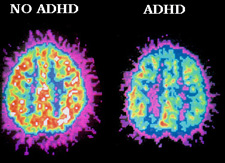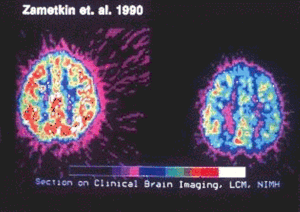ADHD Brains: The Quintessential Supercomputer: Cowboys and sodbusters, the ADHD Supercomputer, by Dr. Jory F. Goodman.Sandy Gautam at The Mouse Trap posted an article this weekend on ADHD and Creativity, suggested that our ADHD brains are different - maybe better - than regular brains.
ADHD and creativity
- Image via Wikipedia
ADHD has traditionally been conceptualized in terms of deficits- that of attention , impulse control or motor restraint; but the new neurodiversity paradigm forces us to take a more balanced look and acknowledge the strengths that the ADHD kid may have- divergent thinking, spontaneity and high energy and vitality.
That brings me to research by Cramform that shows that the symptoms that define ADHD/ADD- hyperactivity, impulsivity and distractability are just the negative connotation and spin put on some of the traits that define highly creative and gifted child- the traits of Vitality, spontaneity and daydreaming/wandering phenotype.
But first things first. ADHD , as many of the readers will know , is defined by three primary symptoms- hyperactivity or the restlessness and fidgety or squirming behavior of the kid; impulsiveness or the inability to control impulses manifest in overt behavior like getting up in class and interrupting; and distractibility where the kid ends up paying too much attention, even to stimuli that are extraneous and should be ignored, thus leading to fleeting attention! ADHD is a traditional classroom misfit and thus a traditional teachers nightmare. However, one should note that a traditional teacher is not too much impressed by the highly creative kid too, who proves to be a bit too much to placate and who doesn’t conform too easily.
But what could be the mechanism why ADD/ADHD must be so closely related to and resembling creativity traits as to be indistinguishable from it by behavioral symptoms alone? I believe dopamine and frontal cortex are the culprit. We have seen in the past that dopamine is related to creativity and we have seen that frontal cortex is related to creativity; and we have also seen that dopamine is related to ADHD. As a matter of fact ADHD on a neurotransmitter level is characterized by dopamine’s quirky behavior , while on the neuroanotomic level is known by the late development of frontal cortex that is an inhibitor to other areas like motor areas and impulsive areas (basal ganglia and sub-cortical regions) thus leading to symptoms of impulsivity and hyperactivity. In creative people too, especially in divergent form of creativity, we see that creativity manifest itself when dopamine comes into play and when frontal regions give up their control of other regions of the brain thus making remote associations more likely.
Of course dopamine is not just involved in ADHD, but also in Psychosis and thus my theory of Autism and Psychosis as opposites would claim that ADHD is childhood form of psychosis and is opposed to Autism. There is already some support for that idea with autism and ADHD being discovered as opposites and with ADHD more common in bipolar probands.
The dual symptoms of ADHD as inattention and as hyperactivity/ impulsivity are easy to conceptualize when one sees that one is trying to maximize predictive ability / minimize surprise and also maximize rewards by being flexible in one;s behavior and taking risks rather that persevering on the well trodden path. Both attention-allocation and action-selection are sensitive to dopamine and in one particular phenotype result in more leaning towards flexibility, distracatibility, hyper energy and arousal and more novelty and thrill seeking. The desire is to explore and not to exploit. The hunter rather than the farmer as per Hartman’s model. These same are characteristics of the creative phenotype- those touched with fire- and thus on the move literally or figuratively- always seeking new combination and ideas and exploring uncharted territory.
Perhaps its time we stopped negatively labellings the gifted, creative ADDers as difficult kids, but rather design and structure classrooms around them that bring their potential to the fullest and make them bloom fully. Lets not stifle the creativity. Lets not devalue the immense energy and joy these child exhibit and the creative potential they embody.
Cramond, B. (1995). The Coincidence of Attention Deficit Hyperactivity Disorder and Creativity. University of Connecticut, The National Research Center on the Gifted and Talented. Other: ED388016



No comments:
Post a Comment